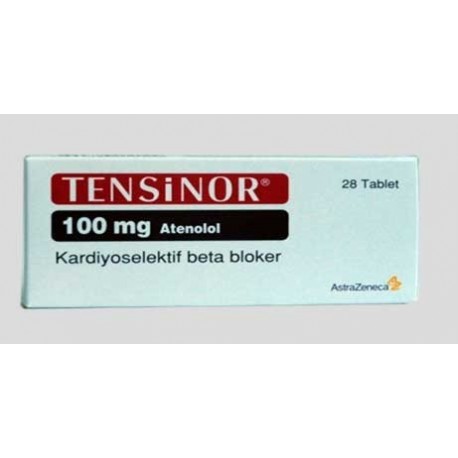 View larger
View larger Volume discounts
| Quantity | Discount | You Save |
|---|---|---|
| 2 | 5% | Up to $2.90 |
| 3 | 10% | Up to $8.70 |
| 4 | 15% | Up to $17.40 |
| 5 | 20% | Up to $29.00 |
More info
TENSINOR 50 mg tablet It is taken by mouth.
Active ingredient
Each tablet contains 50 mg of atenolol.
Excipients
Heavy magnesium carbonate, corn starch, sodium lauryl sulfate, gelatin, magnesium stearate
2.What is TENSINOR and what is it used for?
TENSINOR contains atenolol, a substance belonging to the drug group called "beta-blockers". TENSINOR is used in the treatment of:
High blood pressure (high blood pressure)
Irregular heartbeats (arrhythmia)
- By helping to prevent chest pains (angina)
About to protect the heart from an early attack after a heart attack.
Complaints of long-standing heart failure that does not get worse
This medication works by making your heart beat slower and with less force.
TENSINOR 50 mg tablets; White to cream, biconvex, divided into two equal parts, with a distinctive mark on one side.
3. How to use TENSINOR?
Instructions for proper use and dose / frequency of administration
Adults:
• High blood pressure: The usual dose is 50-100 mg per day.
• Chest pain (angina): The usual dose is 100 mg once a day or 50 mg twice a day.
• Irregular heartbeat (arrhythmia): The usual dose is 50-100mg per day.
• Early treatment of heart attack (myocardial infarction): The usual dose is 50-100 mg per day.
Application route and method
Always use TENSINOR as your doctor has described for you. If you are not sure, ask your doctor or pharmacist.
Your doctor will tell you when and how many tablets to take each day. Write down what your doctor said.
Swallow your tablet with a glass of water.
Take your tablets at the same time every day.
Different age groups
Use in children
Use in the elderly
Use in the elderly
Your doctor may suggest that you use a lower dose, especially if your kidneys have problems.
Special use cases
Kidney failure: If you have severe kidney failure, your doctor may evaluate your condition and decide to use a lower dose.
If you have an impression that the effect of TENSINOR is too strong or too weak, talk to your doctor or pharmacist.
If you use more TENSINOR than you should
If you have used more than you should use from TENSINOR, talk to a doctor or pharmacist.
Take the medicine package with you so that the tablets can be identified.
If you forgot to use TENSINOR
If you forget to take a dose of your medicine, take that dose as soon as you remember. If the next dose is near when you remember, skip the missed dose and continue to use your medication on your normal schedule.
Do not take a double dose to make up for forgotten doses.
4. What are the possible side effects?
Like all medicines, people who are sensitive to the substances contained in TENSINOR may have side effects.
If you notice any of the following, immediately report to your doctor or contact the emergency department of your nearest hospital:
Allergic reaction. Symptoms of an allergy may include raised skin or swelling in your face, lips, mouth, tongue or throat.
All these are serious side effects.
If you have one of these, you have a serious allergy to TENSINOR. You may need urgent medical intervention or hospitalization.
All of these very serious side effects are very rare.
Other side effects that can be seen with TENSINOR are given below with their frequency:
The following adverse events and their incidence have been reported:
Very common (> 10%), common (1-9.9%), uncommon (0.9-0.1%), rare (0.09-0.01%), very rare (<0.01%) (includes isolated cases), unknown (available data not detected with)
Blood and lymphatic system disorders
Rare: fever, pinpoint red bruising, confusion, headache and disease with decreased number of platelets, thrombocytopenia (decrease in platelet-blood platelet count)
Psychiatric disorders
Uncommon: Disturbance of sleep patterns
Rare: nightmares, confusion, personality changes (psychosis) or delusions, mood changes.
Nervous system disorders
Rare: headache, drowsiness, dizziness, especially when you stand up
Eye diseases
Rare: Dry eyes, visual disturbance
Cardiac diseases
Common: slow heartbeat,
Rare: heart block (causes dizziness, abnormal heartbeat, tiredness and fainting),

